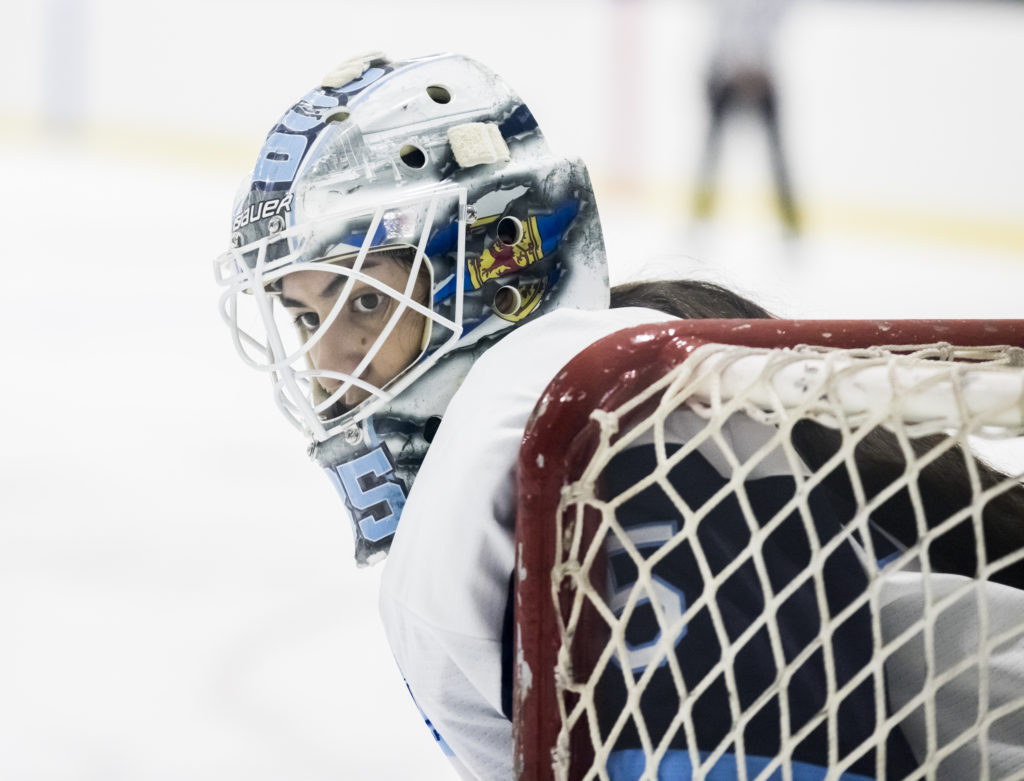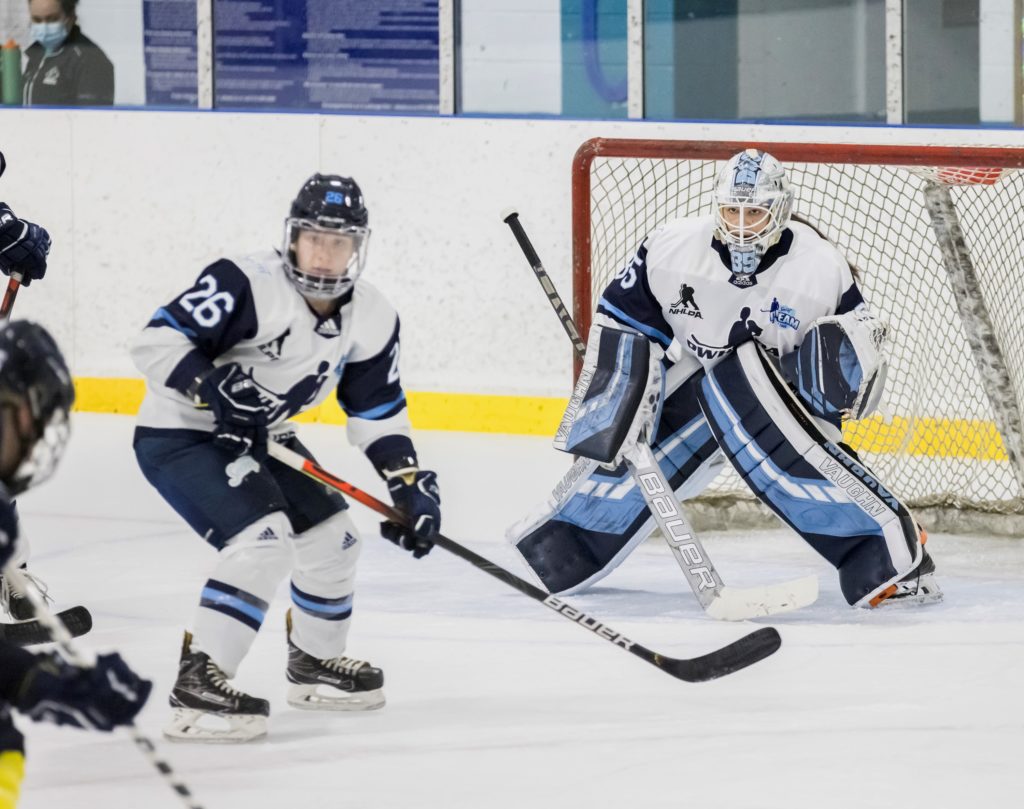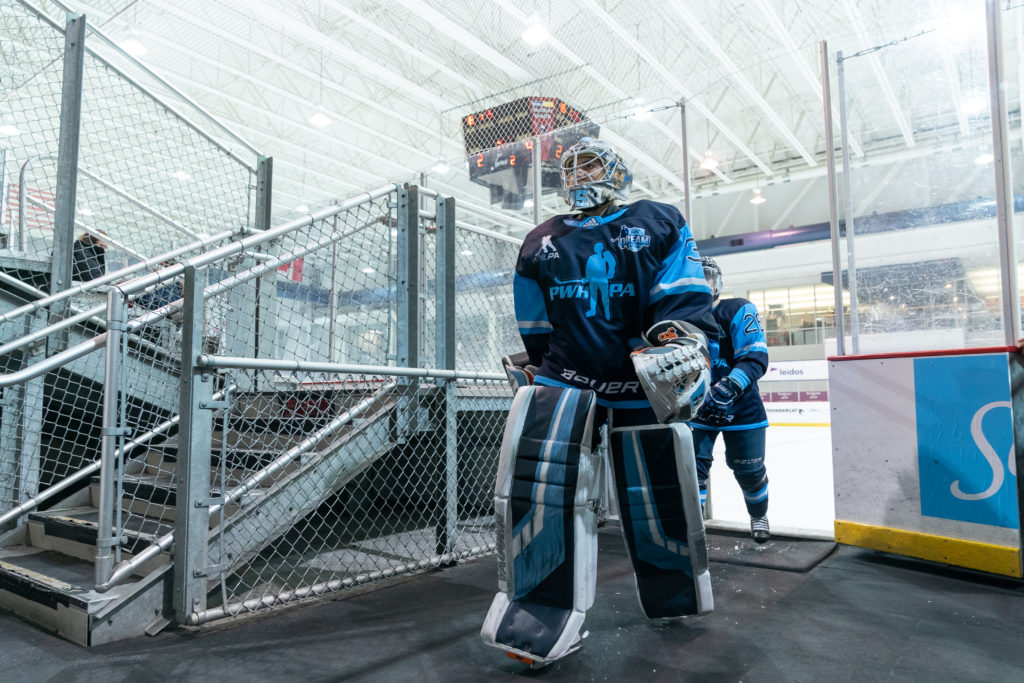Finding A Sense of Self Before Life After Hockey Begins
By Terra Lanteigne
Terra is a professional ice hockey player with the Boston region of the PWHPA as well as a Whole Being Athlete Ambassador. She attended the Rochester Institute of Technology where she pursued her degree while serving as goaltender and assistant captain for the school’s Division I hockey program. She is also a Mechanical Engineer.
My name is Terra Lanteigne, and I am a professional hockey player.
A year ago, I stepped away from sport for the first time and found myself in a battle with anxiety, depression and an identity crisis. Even though I have since returned to athletics, my experiences have taught me how to cope with my eventual (permanent) retirement, whenever that may be, and to be confident in my transition to life after sport. This is my story.

I finally had the free time I had dreamed about but instead of filling it with friends, excitement, and adventures, it brought on a constant sense of anxiety.
Terra Lanteigne
Photo credit: Heather Pollock
Hockey has always been a major part of my life and my sense of self. I never missed a season since I started playing at 8 years old, and many of those years I played through both the winter and summer. I wanted to be the best, and I loved the thrill of chasing that next level of achievement. I always saw my path with hockey.
But by my 4th year of college, I was burnt out. Physically, from playing/training 6 days a week and fighting through injuries I knew needed attention, but also mentally. Behind the smiles, the captaincy, the stats and the awards, I was drained. I didn’t want to quit, but the losing seasons, grueling schedule, schoolwork, and lack of a break took its toll. With my NCAA eligibility coming to an end, but with several post-college playing options available, I made the decision to take my first year without organized hockey in 14 years.
My final season came and went, and for the first few weeks I was relieved. I got to spend more time with my friends than ever before, started planning trips, and taking some well-deserved rest. And then the pandemic hit.
Spring sports had their season canceled, campus closed for the semester, and my plans evaporated. Suddenly I had nothing in my schedule, and no discernible goals to work towards. I finally had the free time I had dreamed about but instead of filling it with friends, excitement, and adventures, it brought on a constant sense of anxiety.

I told myself others had it worse than me, and I suffered in silence until I eventually opened up and decided to recognize the importance of my mental health.
Terra Lanteigne
Photo credit: Heather Pollock
I didn’t have a job lined up, and I was graduating soon. What was I doing wrong? Was it because I lacked something to set me apart? Really, what was unique about me other than the fact I played hockey? Who was I if not an athlete? Stress filled the gaps in my day that used to be dedicated to training, travel, competition, and physical recovery. I had hobbies, I was aware that life did not need to end with my playing career, but I couldn’t find anything that felt worthwhile or motivating. I grew frustrated with myself for not appreciating the time off, sad thinking about how lost I felt, and eventually sunk into a numbness that made getting out of bed difficult. I was depressed.
Some part of me knew I should talk to someone, but I convinced myself my internal battle wasn’t worthy of discussion or therapy. Between the athletes who lost their seasons, the students who were missing graduation, and everyone else on the planet who was struggling for various reasons, I didn’t think I deserved the right to complain or demand help for my problem. I told myself others had it worse than me, and I suffered in silence until I eventually opened up and decided to recognize the importance of my mental health.
I was never sure if my hockey career would continue past college, although that was always my goal, and the ease of my decision to step away from sport was proof that the way I was functioning, internalizing everything and putting my head second behind my body, was unsustainable and damaging. I see that now. I still have to check myself often and remind myself to take a breath, but maintaining a consistent dialogue with my support network has made me stronger than ever.

I returned to hockey, accomplished my goal of becoming a professional hockey player, and intend to continue playing as long as I can, or until it stops making me happy.
Terra Lanteigne
Photo credit: Jess Rapfogel
Taking time away had the added benefit of rekindling my excitement and love for the game, and just like coming back from a physical injury I had a refreshed drive to compete. I returned to hockey, accomplished my goal of becoming a professional hockey player, and intend to continue playing as long as I can, or until it stops making me happy. I don’t have a golden answer or some secret to a flawlessly smooth transition out of competitive sport. What I do know, and what I hope anyone who reads this can walk away with, is that we are all part of a network of athletes, both retired and active who have been there. It is tough, but you’re not alone. As athletes, there is a whole community of people who we can talk to and lean on for support when our careers as players end for good.
